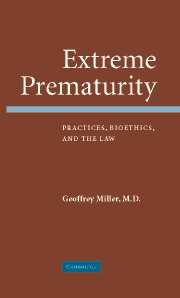Book contents
- Frontmatter
- Contents
- Part 1 THE EXTREMELY PRETERM INFANT: EPIDEMIOLOGY, PERCEPTIONS, AND PRACTICES
- Part 2 BIOETHICS
- 14 Moral Theory
- 15 Autonomy
- 16 Beneficence and Nonmaleficence
- 17 Justice
- 18 Sanctity of Life
- 19 Active and Passive Euthanasia
- 20 Personhood
- 21 Quality of Life and Best Interests
- 22 Futility
- Part 3 REPORTS, OFFICIAL OPINIONS, AND GUIDELINES
- Part 4 THE LAW
- Part 5 EPILOGUE: TRUTH, TRUST, AND BOUNDARIES
- References
- Index
17 - Justice
Published online by Cambridge University Press: 23 September 2009
- Frontmatter
- Contents
- Part 1 THE EXTREMELY PRETERM INFANT: EPIDEMIOLOGY, PERCEPTIONS, AND PRACTICES
- Part 2 BIOETHICS
- 14 Moral Theory
- 15 Autonomy
- 16 Beneficence and Nonmaleficence
- 17 Justice
- 18 Sanctity of Life
- 19 Active and Passive Euthanasia
- 20 Personhood
- 21 Quality of Life and Best Interests
- 22 Futility
- Part 3 REPORTS, OFFICIAL OPINIONS, AND GUIDELINES
- Part 4 THE LAW
- Part 5 EPILOGUE: TRUTH, TRUST, AND BOUNDARIES
- References
- Index
Summary
In general, the principle of justice concerns fairness and rights and dictates that the extremely preterm infant should be treated in the same way as other infants with the same treatable condition, for example, the extremely preterm infant and the full-term infant with progressive hydrocephalus. This ethical principle protects certain moral rights even though, it can be argued, it may conflict with the principle of beneficence.(195) As Foot wrote: “an act which is ‘more humane’ than its alternative may be morally objectionable because it infringes rights.”(196)
Invoking justice as a principle can become arguable if it cannot be agreed that the recipients of an action are equal in some agreed on respect. Another form of justice is distributive justice. This refers to a fair and equitable distribution of resources. It might be argued that the costs of neonatal intensive care for the extremely preterm infant, and the costs and burdens to society of providing for disabled children, are not justified as they threaten the overall welfare of society. If a justification is to be made for limiting such neonatal intensive care on these grounds, then the proponent must provide some measure of the social burden and compare it with other burdens that society agrees to take. The proponent would be required to show that other accepted commitments such as military defense, education, and other aspects of healthcare would be substantially lessened.
- Type
- Chapter
- Information
- Extreme PrematurityPractices, Bioethics and the Law, pp. 68 - 69Publisher: Cambridge University PressPrint publication year: 2006



